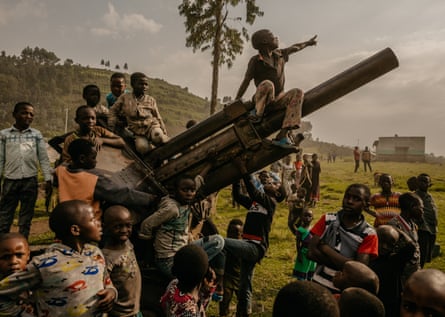The Daily Observer London Desk: Reporter- Sarah Marshal
Nearly 20 years on from a conflict that killed 5 million people and upended the lives of millions more, the Democratic Republic of the Congo (DRC) is once again sliding into chaos. Since 1996, multiple wars have been triggered by a proliferation of armed groups, weak state institutions, a dysfunctional army and local struggles over power and resources.
- Children displaced by conflict with M23 rebels play on an abandoned artillery gun in Kibumba, North Kivu province, in January 2022
Peace deals, elections, the deployment of a UN peacekeeping mission and the efforts of hundreds of humanitarian organisations have failed to transform these dynamics.
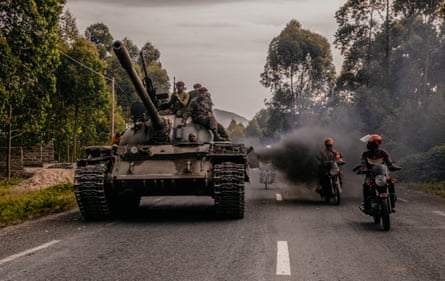
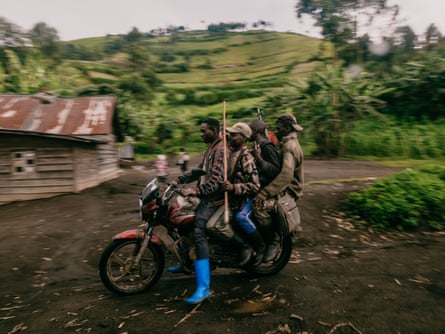
- Fighters of Nyatura, a Congolese Hutu militia, mobilised to fight M23 rebels drive through Masisi, North Kivu province, December 2022. The territory has seen heavy fighting between M23 rebels and a coalition of local armed rebel groups, supported by the Congolese army
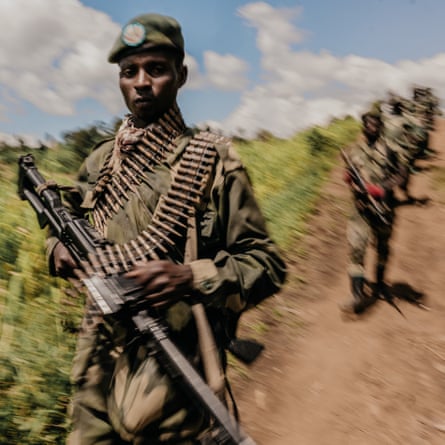
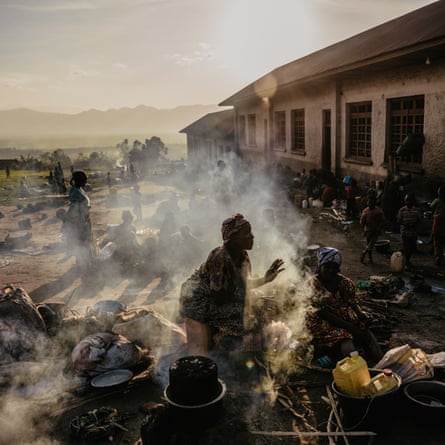
- Above left, Mai Mai militia troops mobilised to fight M23 rebels march near to the town of Kitchanga December 2022. Right: families cook their evening meal at the school building where they have taken refuge in Rutshuru. In the aftermath of fighting between M23 rebels and the Congolese army, about 40,000 civilians fled their homes
Today, violence persists in the eastern provinces of the country, leaving behind a trail of suffering that affects mostly women and children. In a recent incident in the town of Kishishe, the Rwanda-backed M23 rebels reportedly massacred 171 civilians and raped at least 66 women.
Confronted by the horrors of war, peacebuilders are working to create dialogue between soldiers and communities, track human rights violations and advocate for an end to impunity.
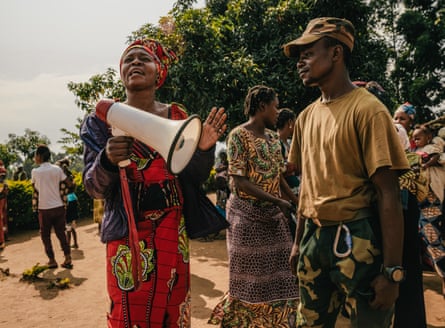
- Peacebuilder Madeline Akida speaks during a meeting between local women and the families of a Congolese army commando unit stationed at a nearby garrison, Beni, July 2022
In one instance, women in Beni, north-east DRC, complained that the families of soldiers, who are often posted to the east of the country from different provinces, had been stealing farmland and food from the community. Peace activists Wivine Bayengo and Faila Kataliko convened talks between the military garrison and local communities to resolve their grievances openly. Beni is at the centre of the insurgency by the Allied Democratic Forces.
The ADF is regularly accused of civilian massacres and has pledged allegiance to Islamic State. In turn, there is a heavy Congolese army presence in the region to combat the ADF. Large numbers of soldiers often brings insecurity to an area as units start to prey on the population they are supposed to protect.
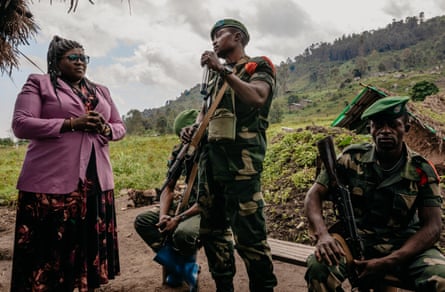
- Faila Kataliko, a peace activist, speaks to soldiers at a meeting of civilians and an army garrison, Beni, May 2022
“We have received complaints of intimidation, extortion, rape and theft from the soldiers based here,” says Kataliko. In response, one of the soldiers says: “You accuse us of mistreating civilians at checkpoints, but they don’t respect the curfew! Women come in from the fields late at night, how do we know they aren’t ADF?”
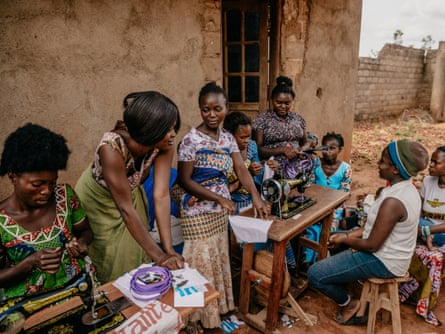
- A women’s peace organisation in the conflict-hit town of Beni runs a studio for young women to create clothing and designs. The vocational training creates financial independence for girls in the area, giving them a source of income as well as a secure communal area
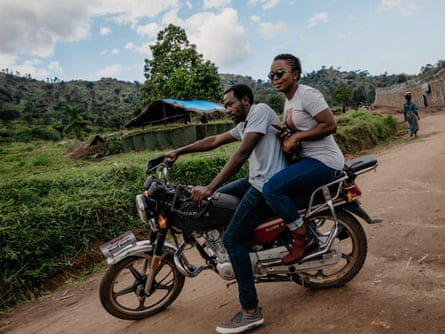
- Wivine Bayengo, a peace activist, jumps on the back of a motorcycle after a meeting between civilians and soldiers
“They say Congo is a rape capital,” says Justine Masika Bihamba with a shrug. “But I say the women of Congo are strong because they don’t remain victims. They become actors of change.” Bihamba was one of the first women to embark on the fight for peace in the 1990s and now leads an association for survivors of gender-based violence. “People don’t respect human life any more. They kill as they please. One day we told each other that we women can no longer keep our arms crossed.”
In Rutshuru, on the frontline of the current fighting with M23, another peace activist, Liberata Buratwa, is running a network of women who work as peace monitors. “Here, insecurity is a cycle,” she says, as she watches a stream of newly arrived families seek shelter wherever they can – in churches, schools and even a football stadium. Gathering a crowd around her, she asks them questions: Which roads had they used to flee? Where was the most intense fighting? Which villages were no longer safe?
Sharing information is a central part of activists’ work. Testimony from on the ground is the only way to assess the security situation and help families decide whether to return home. Soldiers deployed from the distant capital, Kinshasa, do not know the area they operate in, Buratwa explains, and local female peace activists can provide precious information about where the rebels will advance next.
Having collected information, she and some of the displaced women approach Gen Peter Cirimwami of the Congolese army to share their intelligence. “Dear mothers, you came to cry for peace,” exclaims Cirimwami, wagging his finger, “but these rebels, they are your husbands and your sons.”
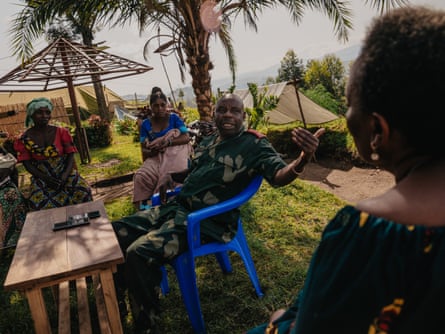
Buratwa’s counter to this reveals her understanding of rebel strategy: “We know the problem – the rebels dress as civilians when they come to scout their attacks. But we know who is who, we can work together, if you keep the camps safe.”
Collaboration between women’s groups and the authorities has historically been difficult, but thanks to the tireless work of women who keep advocating with police commanders, army officers and customary leaders, things are slowly changing.
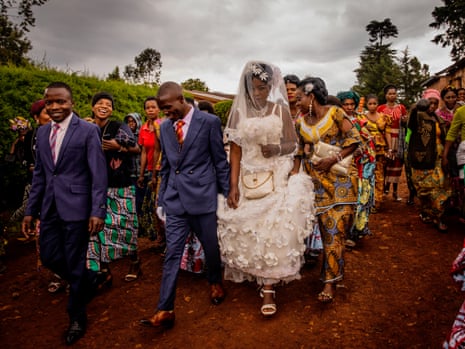
- A wedding procession in the hills of Kaniola, Walungu, South Kivu province, November 2022. A few hundred metres behind the couple is a monument to those massacred in a war that ended over a decade ago. Rwandan Hutu FDLR rebels killed 500 people in this town alone, with war crimes also committed against captives, who were taken to the forest and tortured
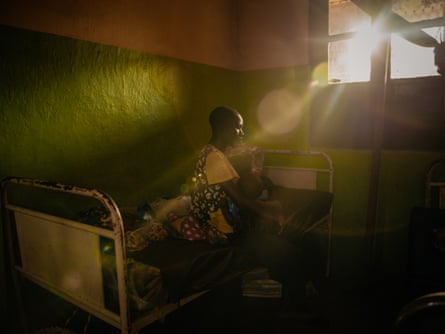
- Mave Bora, 22, sits with her child and her seven-month-old brother. Her mother was killed in a Codeco rebel raid on Lodha displacement camp in Ituri. Codeco is an association of brutal militias involved in a seemingly intractable conflict between two of the region’s ethnic groups, the Hema and the Lendu
Female activists’ documentation of human rights abuses is critical to hold armed actors accountable and advocate for victims. In an area twice the size of Belgium, dozens of armed groups, an Islamist rebellion and forces from several foreign armies including Kenya, Uganda, Burundi and Rwanda are active.
And amid the chaos, the Congolese army is one of the main perpetrators of abuse.
In Butembo, another peace activist, Rose Kahambu Tuombeane, attests to the recurring incidents of rape, intimidation, extortion and theft carried out by soldiers.
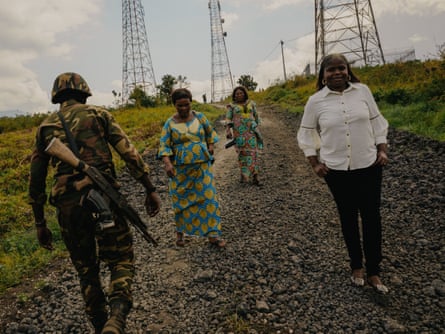
- Peace activists Helen Valinandi, Dekila Vahwere and Rose Kahambu Tuombeane leave a Congolese army frontline headquarters, after speaking to officers there and receiving updates on the security situation close to Kibumba, where an ongoing M23 rebel offensive has displaced tens of thousands of civilians
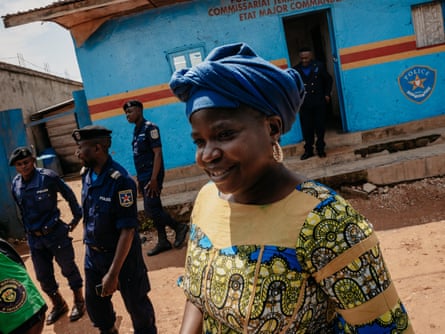
- Tuombeane meets police officers in the town of Oicha to discuss the security situation in several villages, and whether displaced families will be able to return home, May 2022
“Sexual violence is rampant,” she says, with women targeted as they go to the fields or search for water and firewood. “We give them advice to protect themselves, like walking in groups, but recently attackers are getting bolder.”
To prevent violence, Tuombeane and her colleagues organise meetings with the commanding officers to allow women to voice their complaints and demand sanctions. “There is a long way to go,” she says, “but these dialogues are successful and today the community lives in peace with the soldiers.”
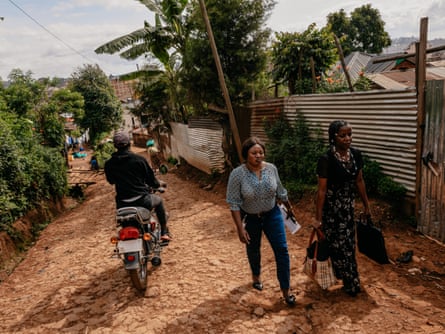


Across town, Lydie Kake is also working to ensure women in remote conflict zones have access to justice. “We want any woman who has been attacked to find her peace,”the lawyer says. As many women cannot afford legal fees, her association pays the US$20 (£17) each case costs to take through a military court.
Kake attends to and cares for complainants throughout the challenging process. “It is not easy. Victims will often withdraw their statements when they see the soldiers.” She explained that those who denounce their attackers may be killed in reprisal to discourage others from coming forward and seeking justice.
As military campaigns have done little to end fighting, it takes immense courage for women to continue searching for peace. “Sometimes I am discouraged when authorities downplay the security issues while I and other activists are fighting to mobilise everyone,” says Tuombeane. “When I think about it, I shed a tear, then pull myself together.”

